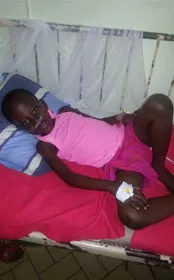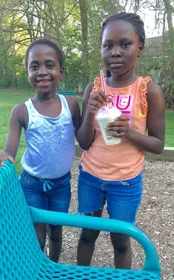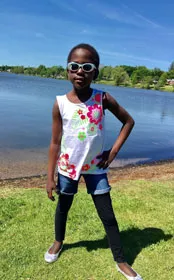When Daniel Akileng learned that his family had been approved for a diversity visa to immigrate to the United States from Uganda in 2016, he couldn't believe his good fortune. Also known as the green card lottery, this U.S. government program makes permanent resident cards available to underrepresented countries. The odds of winning are almost infinitesimal. Daniel, his wife Harriet and their three children were among 17 million applicants.
Quest for sickle cell disease treatment

Immigrating to America held special urgency for the family. They hoped to find treatment for their youngest daughter, Michaela, then 6, who had endured the ravages of Hemoglobin SS, the most severe type of sickle cell disease (SCD) since infancy. Determined to learn more about this disease of the red blood cells and not finding any resources in Uganda, Daniel and Harriet educated themselves. They learned that bone marrow transplantation showed great promise.
Soon after arriving in Massachusetts, they connected with, Cathy Rosenfield, MD a pediatric hematologist at Tufts Medical Center and a leading expert in sickle cell disease. She explained that bone marrow transplantation for SCD requires that a patient meet certain medical requirements and have an appropriate donor. The best donor or "perfect match" must first be a full sibling.
Because it is an inherited condition, a sibling may also have sickle cell disease, deeming them ineligible to donate. According to Dr. Rosenfield, most SCD transplants are done for children who have had serious complications such as a stroke—like the intracranial hemorrhage Michaela experienced in Uganda—but only if there is a matched donor. "Children with sickle cell disease have about an 18% chance of having a healthy sibling who is a perfect match," said Dr. Rosenfield.
The odds were not in the family's favor. "We are prayerful family," said Daniel. "We prayed for a miracle."
Defying the odds
Dr. Rosenfield initially met the family at the Chelmsford Pediatric Specialty Center where she examined Michaela and reviewed her medical history. "Michaela then came to Tufts Medical Center for additional screening tests including a transcranial Doppler ultrasound and blood work. She saw our pediatric ophthalmologist because she had failed an eye exam," Dr. Rosenfield said. Vision problems can be a symptom of sickle cell disease as can fatigue, recurring pain, infection, poor growth and kidney problems.
Because Michaela's parents expressed interest in transplantation, they were tested for HLA (human leukocyte antigen) types which are the proteins—or markers—used to genetically match patients with bone marrow donors. They returned home to Woburn with instructions to swab the inside cheeks of Michaela's siblings Danisha, 9 and Elijah, 4. These samples were sent to a laboratory for typing.
The family waited two weeks and then received a congratulatory phone call from Dr. Rosenfield. Danisha was a perfect match.
Such good news came as an indescribable relief to Daniel and Harriet. They were heartened to have Dr. Rosenfield and the Bone Marrow Transplant Program team by their side. "We could finally sleep at night," said Daniel.
Coordinated transplant care
Michaela was referred to Jason Law, MD, who was the Director of Pediatric Bone Marrow Transplantation, now Interim Chief. Danisha, as the donor, was assigned her own physician. During her evaluation, an abnormal heart murmur was detected. Danisha was referred to Mark Zilberman, MD of Pediatric Cardiology where it was discovered that she had a hole in her heart called an atrial septal defect. This didn't affect her ability to be a donor but it did need to be corrected.
Daniel praised nurse practitioner Cathy MacPherson, NP as "the front runner in our appointments and medications before and after transplant. She was very informative and guided us well."
A team of doctors worked together on the sisters' time-intensive bone marrow transplant processes. "Michaela was admitted to Tufts Medical Center where central lines were inserted in her chest. We administered chemotherapy to destroy the blood cells in her bone marrow and with it the sickle cell disease. She was given medication to suppress her immune system so it wouldn't reject her sister's cells," said Dr. Law.
Meanwhile, Danisha was taken to the Operating Room for a bone marrow harvest, the process of collecting healthy bone marrow from the donor. "We collected bone marrow, the spongy substance inside bones that produces blood and stem cells, from her hip bone using a special needle. Danisha stayed overnight in a room decorated by Child Life Services, down the hall from Michaela's hospital room.

Sister cells grow and strengthen
Social Worker Megan Beaupre said it was a beautiful, celebratory moment when Michaela received her sister's cells. Accompanied by her family and the transplant team, Danisha watched as her cells were infused into Michaela's body. "We told her, 'Those are your cells. They are changing Michaela's life,'" Beaupre said.
Danisha was discharged and recovered quickly. Michaela remained at Tufts Medical Center for five weeks. "As the donor marrow took root, the side effects of chemotherapy began," explained Dr. Law. "Michaela had mouth sores and difficulty swallowing. She was at risk for infection and received blood transfusions and intravenous nutrition. Slowly, eventually, her sister's healthy stem cells grew and replaced Michaela's diseased marrow, creating a strong immune system and a healthy bone marrow."
Michaela returned home but continues to return for outpatient appointments. "She took medication to make sure she didn't develop graft-vs-host-disease and reject Danisha's bone marrow," said Dr. Law. "We monitor her blood counts, kidney function, electrolytes and blood pressure. She is being reimmunized. After one year, Michaela will be considered cured of sickle cell disease."
Promising future. Paying it forward.

Daniel said Michaela is flourishing and is a joyful, loving child. "In Uganda, she would fall down when she tried to play with other kids. Now she is running and climbing with her sister and brother. She is so strong."
Though an exhaustive journey for the family, they are filled with gratitude and future plans. While Harriet cares for the children and oversees Michaela's medical care, Daniel works two jobs to build a better life for his family. He wants to buy his own home, in a nice neighborhood.
He recalls the assistance his family received when they first arrived at Tufts Medical Center. "Our social worker, Megan, helped us with fuel costs, parking and even rent and utilities," said Daniel who had no idea such support existed. Child Life Services coordinated a family trip to Disney World through the Make-A-Wish Foundation.
Now, Daniel wants to help other sickle cell disease families. He hopes to purchase sickle cell test kits to send to Ugandan hospitals. Though American children are screened for SCD at birth, this is not the case in Africa. "Many children suffer without knowing why. I want to provide answers so families can help their children."